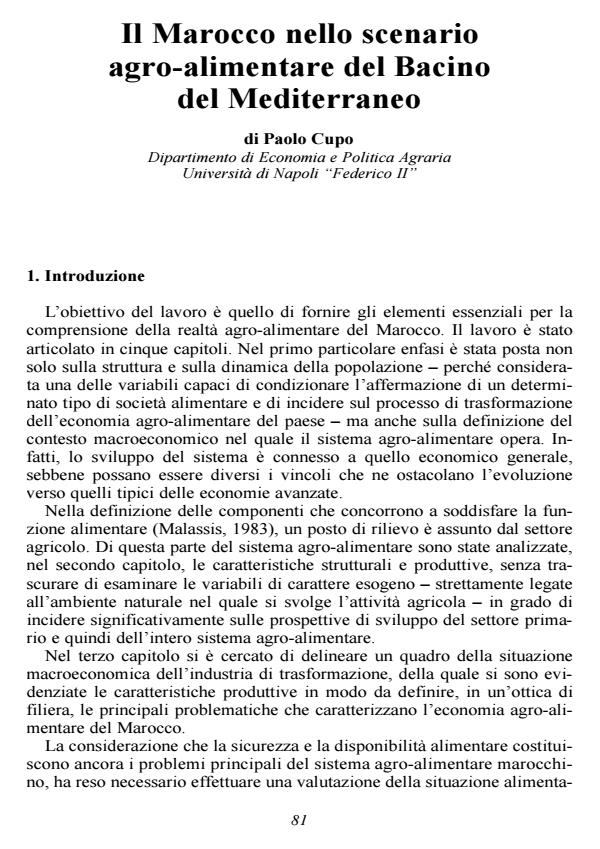Il Marocco nello scenario agro-alimentare del Bacino del Mediterraneo
Titolo Rivista ECONOMIA AGRO-ALIMENTARE
Autori/Curatori Paolo Cupo
Anno di pubblicazione 1 Fascicolo 2000/1
Lingua Italiano Numero pagine 46 P. Dimensione file 186 KB
DOI
Il DOI è il codice a barre della proprietà intellettuale: per saperne di più
clicca qui
Qui sotto puoi vedere in anteprima la prima pagina di questo articolo.
Se questo articolo ti interessa, lo puoi acquistare (e scaricare in formato pdf) seguendo le facili indicazioni per acquistare il download credit. Acquista Download Credits per scaricare questo Articolo in formato PDF

FrancoAngeli è membro della Publishers International Linking Association, Inc (PILA), associazione indipendente e non profit per facilitare (attraverso i servizi tecnologici implementati da CrossRef.org) l’accesso degli studiosi ai contenuti digitali nelle pubblicazioni professionali e scientifiche.
The economy of Morocco is heaving depending on agriculture and, hence, its performance is strongly relating to the exogenous factors such as the weather conditions. For this reason a structural change of the economy should be necessary which, by inducing a shifting of workers among the sectors and reducing the agricultural component of the whole population, will allow to stabilise the domestic demand. Above all for the high rate of population growth the margins for the expansion of the agrifood production are wide. But from this point of view the problems that the system has to face are those relating with the inefficiency of the irrigation system and with the competition exerted by the European productions. In fact, even though the domestic production - especially the horticultural and fruit crops - may still show significant competitive advantages, due to the low cost of labour and to the time of marketing in advance with respect to the productions of the European countries, it still have some gaps to fill up concerning the marketing system and the post-harvest, freezing and transportation technologies. Given that the agriculture still represents the main sector of the economy, then it should be this sector to be favoured in order to feed the structural change which, basing itself on the introduction of technological progress, also favoured by the capital accumulation within the agriculture, allows the permanence of a surplus of labour and the appearance of a surplus of food that stimulate the economic development. Obviously in order that it might come true will depend on how Morocco will decide to extract, transfer and utilise the surplus. In order to reach the most advanced stages of food society, the agricultural sector has to continue to introduce innovations that lead to an increase of the factors productivity, which have already been adopted in the last decades.
Paolo Cupo, Il Marocco nello scenario agro-alimentare del Bacino del Mediterraneo in "ECONOMIA AGRO-ALIMENTARE" 1/2000, pp , DOI: